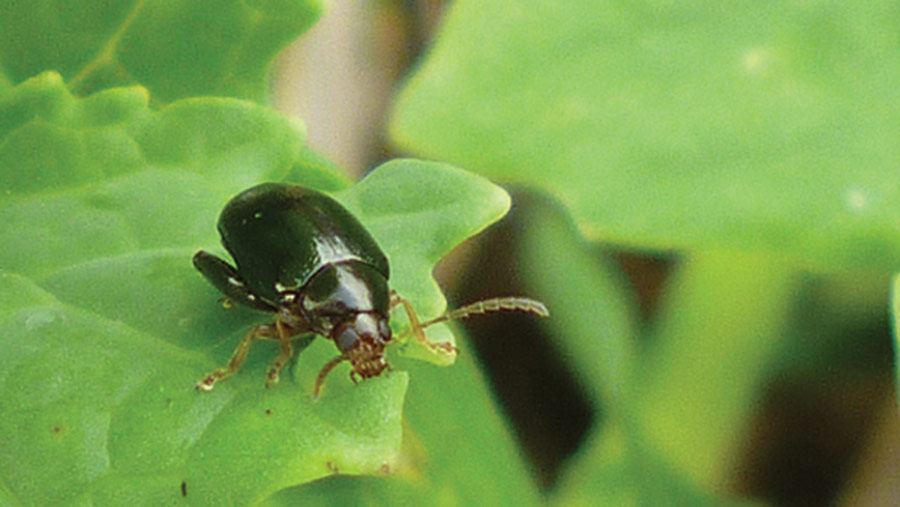Growers take to spraying at night as flea beetles move west

The annual invasion of cabbage stem flea beetle is again giving oilseed rape crops in eastern counties a thrashing, as growers try to curb the pest by any means necessary.
With the total loss of neonicotinoid seed treatments to protect establishing crops this autumn, growers are spraying under the cover of darkness in a bid to rid crops of the damaging pest.
Battling high flea beetle pressure again this autumn, Suffolk farm manager Steven Offord says he is getting good results by spraying after dark as the pest is largely active at night.
See also: Harvest 2016 verdict: What we learned from barley and OSR
He advises checking the level of damage on a field-by-field basis once it is dark and spraying on warm, dry nights for the best results.
“For me spraying at night is the only way to get them. Wait until you see damage at a rate that is worth spraying for – don’t go in too early and don’t get muddled up with old damage.”
This season Mr Offord is growing 120ha of oilseed rape, mostly Nikita, with a smaller amount of Elgar.
He has gone into crops once with pyrethroid product Hallmark (lambda-cyhalothrin) and again a week later with a cypermethrin spray. He now hopes his crops are over the worst of the attacks.
Increased beetle pressure
Frontier agronomist Ed Schofield says flea beetle pressure has really ramped up over the past two weeks in the parts of Bedfordshire and Hertfordshire he covers.
“It’s been pretty bad in places where it has been too dry and the crop hasn’t grown away. Some 10% of crops have been written off in places.”
He says growers are trying absolutely everything to get numbers under control by spraying at night, alternating actives and using adjuvants and water conditioners.
Proof they actually do die… #CSFB #OSR #Clubhectare pic.twitter.com/JKJfp8yelA
— Ed Schofield (@schoFieldWalkin) September 20, 2016
Worries in the West
Further west, growers and agronomists are flagging up a rise in flea beetle numbers, although it is still at controllable levels.
Hutchinsons agronomist Kieran Walsh says flea beetle pressure has exploded in the parts of Gloucestershire, Wiltshire and the Cotswolds that he looks after.
“It normally isn’t an issue here but in the past 10 days it has been rampant in the humid conditions. But here crops went into good seed-beds before the last week of August with starter fertiliser they have been OK with just one pyrethroid spray,” he explains.
Wiltshire grower David Butler says while flea beetle pressure in his part of the country is nothing compared with the blight suffered by those farming in the hotspot counties of Suffolk, Cambridgeshire, Bedfordshire and Hertfordshire, he has needed to spray some areas more than once this season.
“After drilling we got a good rainstorm and after that the oilseed rape really woofed out of the ground and crops are looking good.
“I have had to spray one block twice for flea beetle as a precaution, but other areas have not been sprayed at all.”
Called in another air strike on the dreaded flea beetle again today. One even had a gnaw at the sprayer windscreen! pic.twitter.com/QQDEWIv0HH
— 𝐃𝐚𝐯𝐢𝐝 𝐁𝐮𝐭𝐥𝐞𝐫 🇺🇦 (@DavidButler34) September 18, 2016
Mr Butler notes that regular bouts of rain combined with applications of farmyard manure have helped to get establishing crops off to a flying start, growing away for any pest damage.
In Worcestershire, Agrii agronomist Peter Carr reports that he is also noticing an influx of the pest the the area this season.
https://twitter.com/AgriPete/status/776470784508301313
Meanwhile in Sussex, AICC agronomist Todd Hunnisett told Farmers Weekly oilseed rape crops have gone into generally good conditions and notes flea beetle does not appear to be much of an issue, possibly thanks to wider crop rotations.
“Crops have come up well, albeit late, and the recent rain has been a godsend. We don’t seem to have had the flea beetle problems seen elsewhere.
“I can only put this down to the fact that in our area we have tended to grow oilseed rape a maximum of one year in four, more normally one year in five or even six.”
Night-time spraying trial
Fresh trials aimed at maximising flea beetle control in oilseed rape are getting under way this autumn, looking at water volumes, nozzle selection and spraying under the cover of darkness when the pest is supposedly more active.
The Syngenta work will also investigate the repellency activity of its Hallmark Zeon (lambda-cyhalothrin) product, which could help keep the beetles at bay for longer to allow newly establishing crops to grow away from damaging early attacks.

